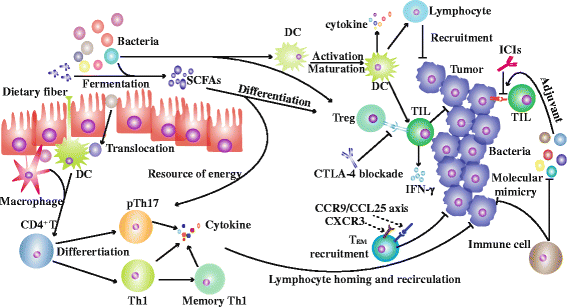Gut microbiome modulates efficacy of immune checkpoint inhibitors
- PMID: 29580257
- PMCID: PMC5870075
- DOI: 10.1186/s13045-018-0592-6
Gut microbiome modulates efficacy of immune checkpoint inhibitors
Abstract
Immune checkpoint inhibitors (ICIs) therapy is a novel strategy for cancer treatments in recent years. However, it was observed that most patients treated with ICIs could not get benefit from the therapy, which led to the limitation of clinical application. Motivated by potent and durable efficacy of ICIs, oncologists endeavor to explore the mechanisms of resistance to ICIs and increase the drug sensitivity. It is known that heterogeneity of gut microbiome in populations may result in different outcomes of therapy. In xenograft model, bacteria in gut have been proved as a crucial factor regulating immunotherapy efficacy. And the similar phenomenon was obtained in patients. In this review, we summarized relevant advancements about gut microbiome and ICIs. Furthermore, we focused on modulatory function of gut microbiome in ICIs therapy and possible antitumor mechanism of specific commensals in ICIs treatment. We propose that gut microbiome is an important predictive factor, and manipulation of gut microbiome is feasible to elevate response rate in ICIs therapy.
Keywords: CTLA-4; Gut microbiome; ICIs resistance; Immunotherapy; PD-1/PD-L1.
Conflict of interest statement
Ethics approval and consent to participate
Not applicable.
Consent for publication
Not applicable.
Competing interests
The authors declare that they have no competing interests.
Publisher’s Note
Springer Nature remains neutral with regard to jurisdictional claims in published maps and institutional affiliations.
Figures

Similar articles
-
Gut microbiome influences efficacy of PD-1-based immunotherapy against epithelial tumors.Science. 2018 Jan 5;359(6371):91-97. doi: 10.1126/science.aan3706. Epub 2017 Nov 2. Science. 2018. PMID: 29097494
-
The intimate relationship between gut microbiota and cancer immunotherapy.Gut Microbes. 2019;10(3):424-428. doi: 10.1080/19490976.2018.1527167. Epub 2018 Oct 19. Gut Microbes. 2019. PMID: 30339501 Free PMC article.
-
Modulatory effects of gut microbiome in cancer immunotherapy: A novel paradigm for blockade of immune checkpoint inhibitors.Cancer Med. 2021 Feb;10(3):1141-1154. doi: 10.1002/cam4.3694. Epub 2020 Dec 25. Cancer Med. 2021. PMID: 33369247 Free PMC article. Review.
-
Immunological and clinical implications of immune checkpoint blockade in human cancer.Arch Pharm Res. 2019 Jul;42(7):567-581. doi: 10.1007/s12272-019-01140-1. Epub 2019 Mar 6. Arch Pharm Res. 2019. PMID: 30843144 Review.
-
The gut microbiota and immune checkpoint inhibitors.Hum Vaccin Immunother. 2018;14(9):2178-2182. doi: 10.1080/21645515.2018.1442970. Epub 2018 Apr 9. Hum Vaccin Immunother. 2018. PMID: 29494275 Free PMC article.
Cited by
-
Sphingosine kinase 1 promotes tumor immune evasion by regulating the MTA3-PD-L1 axis.Cell Mol Immunol. 2022 Oct;19(10):1153-1167. doi: 10.1038/s41423-022-00911-z. Epub 2022 Sep 1. Cell Mol Immunol. 2022. PMID: 36050478 Free PMC article.
-
Microbiome as a Target for Cancer Therapy.Integr Cancer Ther. 2020 Jan-Dec;19:1534735420920721. doi: 10.1177/1534735420920721. Integr Cancer Ther. 2020. PMID: 32564632 Free PMC article. Review.
-
Gut microbiota-mediated tributyltin-induced metabolic disorder in rats.RSC Adv. 2020 Dec 8;10(71):43619-43628. doi: 10.1039/d0ra07502g. eCollection 2020 Nov 27. RSC Adv. 2020. PMID: 35519721 Free PMC article.
-
Gut Microbiota: A Promising Milestone in Enhancing the Efficacy of PD1/PD-L1 Blockade Therapy.Front Oncol. 2022 Feb 16;12:847350. doi: 10.3389/fonc.2022.847350. eCollection 2022. Front Oncol. 2022. PMID: 35252014 Free PMC article. Review.
-
Radiation-induced PD-L1 expression in tumor and its microenvironment facilitates cancer-immune escape: a narrative review.Ann Transl Med. 2022 Dec;10(24):1406. doi: 10.21037/atm-22-6049. Ann Transl Med. 2022. PMID: 36660640 Free PMC article. Review.
References
Publication types
MeSH terms
Substances
LinkOut - more resources
Full Text Sources
Other Literature Sources
Research Materials

